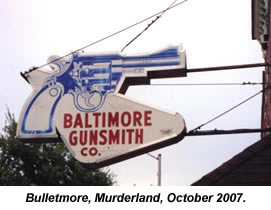 So, why murder ballads? First and foremost, I think it's because they're essentially a form of journalism. Most of the songs you'll find discussed here were written very soon after the real-life crimes they describe, and sold in the streets within hours of the killer's capture or execution. Cheerfully vulgar, revelling in gore, and always with an eye on the main chance, these songs were tabloid newspapers set to music, carrying news of all the latest 'orrible murders to an insatiable public.
So, why murder ballads? First and foremost, I think it's because they're essentially a form of journalism. Most of the songs you'll find discussed here were written very soon after the real-life crimes they describe, and sold in the streets within hours of the killer's capture or execution. Cheerfully vulgar, revelling in gore, and always with an eye on the main chance, these songs were tabloid newspapers set to music, carrying news of all the latest 'orrible murders to an insatiable public.
Then there's the fact that murder ballads never stop mutating, morphing to suit local place names as they cross and re-cross the Atlantic, and changing with the times as they move down the decades to fascinate each generation's biggest musical stars. Victims are bludgeoned, stabbed or shot in every verse and killers are often hanged, but the songs themselves never die.
For all this mutability, the core facts of the story in each song are surprisingly persistent, and give us just enough information to follow a trail through the clippings library to the real individuals whose short lives and brutal deaths have become an indelible part of popular culture. No-one's going to care how you or I met our ends 100 years from now, but they'll still be singing Billy Lyons' tale and recalling his fatal encounter with that bad man Stagger Lee.
Follow PlanetSlade on Twitter @MoshpitMemories
PlanetSlade's second Twitter stream runs daily extracts from my diaries as a young music fan. These cover the years from 1975-1981, a period which included the glory days of UK punk. Between the ages of 16 and 23 I saw most of that era's best bands play live in tiny clubs, bought more than my share of their wonderfully invigorating records and drank an ocean of beer.
Tweets by @MoshpitMemories
